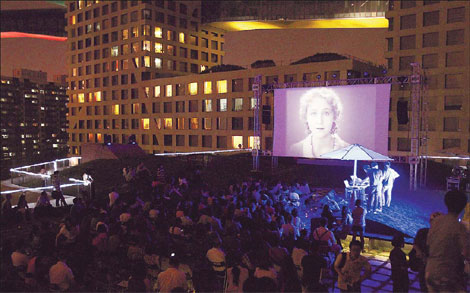Art
A work in progress
Updated: 2011-09-21 07:50
By Liu Wei (China Daily)
|
Film fans watch the German silent movie Metropolis on the rooftop garden of a building in Beijing. [Jiang Dong / China Daily] |
Art films are seeing a surge in popularity but the lack of quality works is a major stumbling block. Liu Wei reports.
It's a late summer evening, and Yang Dameng, 29, is on the roof of a four-story building in Beijing. He is joined by another 100, some on chairs and others sprawled out on the rooftop garden, sipping soft drinks and wine, as the German silent film Metropolis plays on a big screen. The sci-fi classic of the 1920s is accompanied by live music from a three-person band. "Everything feels right," the freelance writer says.
The idea of showing the classic on the roof was born on the first floor of the same building, where Broadway Cinematheque, one of Beijing's rising art cinemas, founded in 2009, is located.
As most films released in mainland theaters are commercial flicks, cinemas such as Broadway, are attempting to offer a different choice, especially in a metropolis like Beijing, where 80 percent of the nation's art schools, filmmakers and studios are located.
Metropolis was one of three German silent films of its recent themed screening, "The Metropolis on the Roof". The films were shown six times, thrice on the roof, between Aug 31 and Sept 11.
Wu Jing, programming and marketing manager of the cinema, tells China Daily that tickets for the rooftop showings, costing about 100 yuan ($14), almost sold out.
Having worked in the cinema since it opened, Wu sees her job more as a curator than manager.
"At present we are still cultivating the market," she says. "We need time to bring more art film enthusiasts into theaters."
What bothers her most, though, is the lack of quality films.
 |
China imports about 40 foreign films for theatrical release every year. Besides, all films screened in commercial cinemas, both domestic and foreign, need to pass the censorship of the State Film Bureau, the top industry regulator in China.
Wu then selects the artsy ones from those that make the cut. "Unfortunately, we don't have a lot of choice," she says.
Xie Meng, manager of Art Cinema, Ullens Center for Contemporary Art (UCCA), shares Wu's concerns.
As part of a non-profit art institute, it does not need permission from the authorities on the selection of films, but even so Xie finds it difficult to find the best ones.
"Although we do not import foreign films for commercial release, there is still a lot of paperwork involved. Sometimes, we have to turn to the embassies for help," he says. "Meanwhile, domestic filmmakers, at least so far, have not produced many great art films."
Sun Dongmei, publicity manager for China Film Archive, another noted art films venue in Beijing is more upbeat.
The archive, supported by the government, has a collection of more than 30,000 Chinese and foreign films.
Over 15 years it has been screening one or two foreign films every week, most of which have never entered mainland commercial theaters. Recent showings include Luc Besson's Leon: The Professional, and Woody Allen's Scoop.
A ticket costs 20 yuan, while a ticket to a Hollywood blockbuster in Beijing often costs more than 50 yuan.
"As an academic institute, we do not try to make money," Sun explains.
What she and her colleagues find challenging, though, is selecting films that audiences want to see. They often have to resort to micro blogs and online bulletins for this.
Despite concerns over how art cinemas can support themselves, given the shortage of quality works, their managers seem excited by the growing viewer passion for art films.
Wu Jing of Broadway Cinematheque calls attention to her popular Young Chinese Filmmakers Showcase, which features the first or second works of young directors that have failed to make it to mainstream cinemas or do not survive the fierce competition.
Among them is Deep in the Clouds, set amid the Lisu ethnic group of Southwest China.
The film, done in the Lisu dialect and featuring amateur actors, has been ignored by mainstream theaters, but has been shown regularly at Broadway's 200 capacity hall, since April. Tickets often sold out, much to the surprise of its director Liu Jie.
Till Wu lobbied him to show the film in her theater, he never thought of screening it in a cinema.
"I did not want my film to take a 'one-day tour' in theaters and then disappear - that's what usually happens at a regular cinema," he says.
"But it was respected and cherished by Broadway and its audience. I am very thankful to the cinema for its courage and understanding of my work."
Broadway's filmgoers club now has about 6,000 members.
Xie Meng of UCCA has also seen a growth in audience numbers.
In the past, he says, few people would speak up in the question-and-answer session after a film's screening, but this has changed in recent years, with many asking insightful questions.
"We hope for more open policies that will further boost the art cinema scene," he says.
E-paper

The snuff of dreams
Chinese collectors have discovered the value of beautiful bottles
Perils in relying on building boom
Fast forward to digital age
Bonds that tie China. UK
Specials

Let them eat cake
Cambridge University graduate develops thriving business selling cupcakes

A case is laid to rest
In 1937, a young woman'S body was found in beijing. paul french went searching for her killer

Banking on change
Leading economist says china must transform its growth model soon

